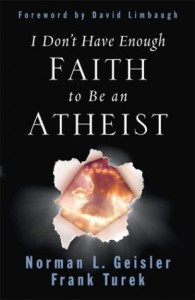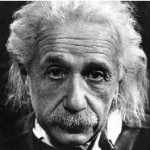Critiquing "I Don't Have Enough Faith to Be an Atheist" (Ch3, P2)
Welcome back. Here's where we're at in Geisler and Turek's 12-point argument for Christianity:
1. Truth about reality is knowable. (Actually, we've shown it's impossible to know if this is true, but also that it doesn't matter, so Geisler and Turek are OK here.)
2. The opposite of true is false. (No argument from me!)
3. It is true the Theistic God exists, as evidenced by:
3a. the Cosmological Argument. (I agree, but ironically the Bible doesn't)
Now that they've proven the universe had a beginning, Geisler and Turek reach this chapter's selling point. Quoth they:
"In light of all the evidence for a beginning of the space-time universe, the Beginner must be outside the space-time universe." (92)
And according to them, that "Beginner" must be:
self-existent, timeless, nonspatial, and immaterial (since the First Cause created time, space, and matter). In other words, he is without limits, or infinite.
unimaginably powerful, to create the entire universe out of nothing
supremely intelligent, to design the universe with such incredible precision (we'll see more of this in the next chapter);
personal, in order to choose to convert a state of nothingness into the time-space-material universe (an impersonal force has no ability to make choices).
What "Beginner" could possibly fit all these criteria?
Only God, of course - but that's not particularly a problem for us, since of the four characteristics Geisler and Turek identify here, only the first is of any certainty. Sure, the First Cause must have been outside of our universe, but there's no way to tell how "powerful" it was (a match isn't very powerful on its own, but lying next to a tank of gas it commands respect). And Geisler and Turek won't be showing us evidence for the universe's intelligent design until Chapter 4, so they can scarcely cite it now. As for the idea that the First Cause must be intelligent because an unintelligent force couldn't choose to create our universe, that's simply silly; since we have absolutely no idea how our universe's multiple dimensions interact with other dimensions, we have no way of knowing how necessary the ability to choose was for Creation.
As for what alternative to God might be "self-existent, timeless, nonspatial, and immaterial", allow me to introduce you to:
THE MULTIPLE-UNIVERSE THEORY
There are multiple versions of the Multiple Universe Theory (As you might expect! Ha!), but the concept at its most basic is that our space-time universe is one of many and that other universes may have different laws governing them than we do. So while logic would seem to dictate that our space-time universe requires a beginning, it may well be that another universe is eternal, and that universe has given birth to ours (or given birth to a universe which has given birth to ours, etc.).
Actually, Geisler and Turek themselves introduce us to the theory in I Don't Have Enough Faith, but they strangely wait until Chapter 4 to do so, rather than including it in this chapter's list of atheist explanations for the Big Bang.
Which is not to suggest they don't have an answer for it. They do:
"First, and most significantly, there's no evidence for it! The evidence shows that all of finite reality came into existence with the Big Bang. Finite reality is exactly what we call 'the universe'. If other finite realities exist, they're beyond our ability to detect... That's why this multiple universe idea is nothing more than a metaphysical concoction - a fairy tale built on blind faith..."
It's just the most breathtakingly hypocritical answer you can possibly imagine.
I shouldn't have to tell you why. In fact, I don't even believe Geisler and Turek need to have it explained to them how, absent any other evidence, it's just as easy to suggest an eternal, non-material, alternate universe as an eternal, non-material, omnipotent, omniscient being.
I do, however, think it's worth explaining why it's not simply just as easy, but easier to suggest another universe than a god. And for that, I'll need to employ two tools: the Principle of Analogy and Occam's famous Razor.
The Principle of Analogy, somewhat related to the Principle of Uniformity raised by Geisler and Turek (but not until Chapter 5), is basically a rule of thumb for judging the likelihood of claims about facts and events. The idea is we should compare any new claims to our own knowledge of past and existing trends. The claims which most conform to what we know already are most likely to be true.
Everyone uses this principle to navigate through life, of course, because there's really no alternative yardstick to use. Everyone, of course, also ignores this principle at some point for volitional reasons. And yes, sometimes people follow the principle and are wrong, and sometimes people don't follow it and turn out to be right. The principle of analogy's just a rule of thumb, after all.
What's more, it's mildly subjective. Two people may have different experiences with a third person, giving them two different viewpoints on how likely it is that third person would do something wrong.
All those caveats made, however, it bears repeating: no alternative yardstick exists.
Occam's Razor is even easier to explain as a concept: it's the idea that the best explanation for anything is usually the simplest explanation accounting for the most evidence. Of course, accounting for evidence can make even the most simple explanation available to us very, very complicated, but there you have it.
OK: let's apply these principles to the respective likelihoods of God and a different universe. What is immediately clear is that God is a more alien and complicated concept to our experience. We are at least certain that such a thing as a universe can and does exist. Yes, an everlasting universe with different physical laws does seem pretty out there, but every difficulty we encounter in conceiving one is also met when we try to conceive God, and in imagining Him we must also wrap our head around the existence of a personality of a far greater complexity than our own. Compare the number of question marks another universe creates versus the number brought up by a Supreme Being and there's really no contest.
CONCLUDING CHAPTER 3
While Geisler and Turek manage to convince me the universe had a First Cause, so far they haven't given any good reasons for why that First Cause must be a god. To be fair, though, we're clearly not meant to take the Cosmological Argument as stand-alone proof, but as the first of four lines of evidence, with the other three to be detailed in Chapters 4-7. We'll jump into the second line on Wednesday.
Ere we do, however, a few final notes on the chapter which I don't feel are worth full blog posts.
_ Eins_:
Since his name and likeness have become inseparably linked with Science itself in our culture, Dr. Albert Einstein's personal beliefs about God have themselves become a "football" in the ongoing debate between theists and atheists, with each side arguing Einstein shared their world view - the illogical, but very human assumption being that whichever side Einstein was on, Science must be on. For the record, atheists were right. Einstein himself got so sick of theists misappropriating his name that he released this statement:
"It was, of course, a lie what you read about my religious convictions, a lie which is being systematically repeated. I do not believe in a personal God and I have never denied this but have expressed it clearly. If something is in me which can be called religious then it is the unbounded admiration for the structure of the world so far as our science can reveal it."
Chapter 3 of_ I Don't Have Enough Faith..._ worrisomely begins, "It was 1916 and Albert Einstein didn't like where his calculations were leading him." So I felt grimly certain as I continued reading that they would make the infuriating error of suggesting he was a theist.
I wasn't prepared for what I found instead. The following, merrily bizarre sentence made me laugh out loud:
"Although Einstein said that he believed in a pantheistic God (a god that is the universe), his comments and statements admitting creation and divine thought better describe a theistic god."
Now, never mind that Einstein never claimed to be a pantheist, or admitted the existence of "divine thought". What's amusing is the petulant comment at the end that, even though the Avatar of Science regrettably wasn't a theist, what he said sure sounds more theist than atheist.
Reading that, I just can't help imagining a bitter girl muttering to another, "Fine, the dress is yours. But I look better in it." It's fabulous.
Zwei:
Speaking of misappropriation, Geisler and Turek also heavily suggest in this chapter that the Big Bang Theory is somehow theist property. In fact, just judging from what they've written in this section, you might be forgiven for thinking atheists have always found the Big Bang Theory as odious as they do Young Earth Creationism.
As someone who grew up in the same Southern Protestant culture the authors are representing, I don't even have to do research to know that the divide presented by Geisler and Turek here - of Christians and the Big Bang Theory on one side, atheists with their Steady State on the other - is a complete fabrication. If you don't want to take my word for it, though, just google the words "Big Bang Theory Christian view". The top entries that come up will be articles by Protestants decrying the theory as one more lie from Satan.
Yes, the Big Bang Theory was first proposed by a theist - a Roman Catholic priest, in fact, who personally thought it a religiously neutral idea (and his church would later come to agree, thus displaying a commendable openness to evidence coupled with a lack of recognition for the need for consistency). He also did propose it at a time when most secularists believed in an eternal universe and yes, a number of disagreeing atheists accused him of injecting his theology into his science.
But begging your pardon, so what?
It's one of the stranger ways Christians think that I've encountered, even as a Christian myself, but for some reason (or rather, no reason) they seem to think any scientific discovery made by a Christian is a feather in their faith's cap, or even one of many "points" scored to be compared with the number of discoveries made by nonbelievers.
"Most Western science is built on discoveries by Christians!" you hear them say. "Copernicus? Christian. Galileo? Christian. Einstein? He sounded like one."
Sometimes the point of their listing these names is to prove Christians are capable of good science. No atheist ever seriously charged otherwise, but there you have it. Other times the point seems to be that the discoveries of great thinkers are somehow inseparable from their beliefs about God, as if the Theory of Gravity only makes sense so long as you're the same sort of monotheist as Sir Isaac Newton was. Which is bonkers.
By no logic is an atheist "borrowing from" Christianity by accepting the Big Bang Theory or any other concept previously understood by the religious. Yet that's clearly what Geisler and Turek imply, again and again, in this chapter.
Drei:
Finally, Geisler and Turek cap off the whole chapter with the "really good question": "If there's no God, why is there something rather than nothing?" (94)
Another question shows how not-so-good it really is: "If there's a God, why is there a God rather than no God?"
At some level, it's all arbitrary, Guys.
Chapter 4 starts Wednesday.



